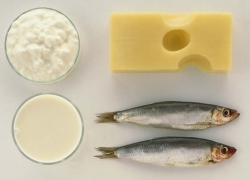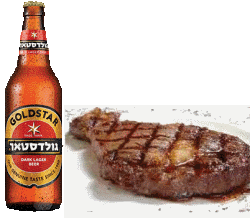בְּרָכָה
Updated: 2013.09.29
Bᵊrâkh•âhꞋ; blessing, pl. בְּרָכוֹת, connective sing. בִּרְכַּת (bi•rᵊk•atꞋ…; blessing of…).
The passive present verb is בָּרוּךְ, from the trans. pi•eilꞋ בֵּרַך, which is, in turn, from the root בָּרַך. Thus, Bâ•rukhꞋ ha-SheimꞋ means "Blessed is 'the Name'."
If I liken the practice of תּוֹרָה to martial skills, then implementation of ka•shᵊr•utꞋ and properly keeping שַׁבָּת equate to a white belt, implementation of the practice of all of the remaining mi•tzᵊw•otꞋ and learning to pray Tei•mân•iꞋ liturgy equate to a brown belt, and mastery of the בְּרָכוֹת, the code of Dâ•widꞋ ha-MëlꞋëkh, equates to achievement of the black belt. The black belt cannot be earned without first earning a brown belt, and a brown belt cannot be earned without first earning a white belt.
Mastering the בְּרָכוֹת can also turn one's life around 180°. While we each must be cognizant of life's downs, losses and hardships, the one who can confess thanksgiving in the midst of "the valley of the shadow of death" is one who has developed the ability to focus on the positive; and to confess thanksgiving despite sometimes not understanding why; yet, knowing that the Creator has a bigger picture and created us in love and caring for our best interests though we, like children, often don't see or understand that bigger picture.
Further, as one develops this skill, we better appreciate the paradigm of Dâ•widꞋ ha-MëlꞋëkh. Where we struggle to learn to confess a בְּרָכוֹת, especially from the valleys of loss and hardship, Dâ•widꞋ ha-MëlꞋëkh would compose a Tᵊhil•âhꞋ! There's the paradigm of the eternal Nâ•siꞋ and Ko•heinꞋ in the heavens of Yᵊkhëz•qeilꞋ 34.20ff & 37.20ff.
Bᵊrâkh•otꞋ are overt (not secretive or apologetic) confessions of thanksgiving and praise. Accordingly, they are recited aloud, as praise to י‑‑ה, and should be so routinely practiced, every day, that they become committed to, and recited from, memory; routine observations punctuating everyday conversation. (Such memorization is also a good brain exercise.) This is a core practice of Tor•âhꞋ. Yᵊhud•âhꞋ means "he who shall confess-thanks."
First & overriding rule: don't allow rabbinic excesses of pedantry to inhibit your confessions of praise and thanksgiving. Your heartfelt confessions of praise and thanksgiving, however "unrabbinic," are treasured by י--ה; and it is He, not rabbis, to Whom you confess them. While Hebrew is de rigueur, the paradigms below are models and are not any iron-clad, "only acceptable" blessing.
Every ËrꞋëv Sha•bâtꞋ and ËrꞋëv Khag, Qi•dūshꞋ is prefaced by the bᵊrâkh•ōtꞋ over children (followed by the Eish•ëtꞋ KhaꞋyil) ![]()
A bᵊrâkh•âhꞋ is in order for every first or special event perceived by any of the five senses, and may be organized accordingly. The following bᵊrâkh•ōtꞋ are each introduced by the conventional praise:
Sight
Nature's forces: storm, lightning, meteor—שֶׁכֹּחוֹ מָלֵא עוֹלָם
Nature's scenery: majestic mountains, lakes or rivers, wilderness, the sun in its time (sunrise or sunset) and the moon in its purity—עוֹשֶׂה בְּרֵאשִׁית
Nature's scenery: rainbow—זוֹכֵר הַבְּרִית, נֶאֱמָן בִּבְרִיתוֹ, וְקַיָּם בְּמַאֲמָרוֹ
Neis, seeing site of historical neis for Yi•sᵊr•â•eilꞋ—שֶׁעָשָׂה נִסִּים לַאֲבוֹתֵינוּ בַּמָּקוֹם הַזֶּה
Neis, seeing site of personal neis—שֶׁעָשָׂה לִי נֵס בַּמָּקוֹם הַזֶּה
Neis, for tza•diq•imꞋ, visiting sites like עֵמֶק אַיָּלוֹן (location of battle where the sun "stood still") and עֵמֶק הָאֵלָה (where Dâ•widꞋ slew גָּלְיָת)— שֶׁעָשָׂה נֵס לַצַּדִּיקִים בַּמָּקוֹם הַזֶּה
New (experience, festival, building or buying one's new home or new utensils, including tools, wearing new apparel for the first time, eating new fruit for the first time in a growing season, seeing or hearing a positive report of, your khâveir(âh) in good health and happy after not having seen him (or her) for 30 days)—שֶׁהֶחֱיָנוּ וְקִיְּמָנוּ וְהִגִּיעָנוּ לַזְּמָן הַזֶּה
Trees blooming in Firstmonth (garden, grove or orchard)—שֶׁלֹּא חִסַּר בְּעוֹלָמוֹ כְּלוּם, וּבָרָא בוֹ בִּרְיוֹת טוֹבוֹת כְּדֵי לְהִתְנָאוֹת בָּהֶם בְּנֵי אָדָם (in order to be making Bᵊn•eiꞋ-•dâmꞋ comely among them).
His Wisdom to flesh and blood, seeing—שֶׁנָּתַן מֵחָכְמָתוֹ לְבָשָׂר וָדָם
His Wisdom to reverers, seeing—שֶׁנָּתַן מֵחָכְמָתוֹ לִירֵאָיו
בִּרכַּת הַמִּינִים (see Bi•rᵊk•atꞋ ha-Min•imꞋ)
600,000 of Yi•sᵊr•â•eilꞋ in ËrꞋëtz Yi•sᵊr•â•eilꞋ, seeing—חֲכַם הָרָזִים
Non-Tor•âhꞋ religious congregation, seeing (including Muslim & Christian/"messianic")—שֶׁנָּתַן אֶרֶךְ אַפַּיִם לְעוֹבְרֵי רְצוֹנוֹ
A•vod•âhꞋ Zâhardships ;r•âhꞋ, seeing that a non-Tor•âhꞋ (including Muslim & Christian/"messianic") religious congregation has closed—שֶׁעָקַר עֲבוֹדָה זָרָה
If the location was in ËrꞋëtz Yi•sᵊr•â•eilꞋ, then the bᵊrâkh•âhꞋ continues: מֵאַרְצֵנוּ, otherwise it continues מִן הַמָּקוֹם הַזֶּה
Finally, this bᵊrâkh•âhꞋ concludes:
כְּשֵׁם שֶׁעָקַרְתָּ מִן הַמָּקוֹם הַזֶּה, כָּךְ תַּעְקוֹר מִכָּל הָאֲרָצוֹת וְתָשִׁיב לֵב עוֹבְדֵיהֶן לְעָבְדָךְ
(Just as You uprooted [them] from this place, so you may You uproot [them] from all of the lands and return the heart of their ["the lands"] workers to Your work.)
Bat•eiꞋ-Yi•sᵊr•â•eilꞋ (people or land), seeing destruction—דַּיָּן הָאֱמֶת
Bat•eiꞋ-Yi•sᵊr•â•eilꞋ, seeing settled in Yi•sᵊr•â•eilꞋ—מַצִּיב גְּבוּל אַלְמָנָה (cf. Mi•shᵊl•eiꞋ Shᵊlom•ohꞋ 15.25).
Hearing
Generally, news meriting congratulations reaches us via our ears.What's luck got to do with it? "Congratulations!" Not "מַזָּל טוֹב"! A Tor•âhꞋ-correct response would be:
בְּרָכוֹת וְאִחוּלִים!
Nature's forces: wind, storm, thunder—עוֹשֶׂה בְּרֵאשִׁית or שֶׁכֹּחוֹ מָלֵא עוֹלָם
hearing a positive report of a khâveir(âh), or another, in good health and happy (also over a positive report resolving a question concerning the ka•shᵊr•utꞋ of wine and the like)—הַטּוֹב וְהַמֵּטִיב
Smell
Recited when smelling the fragrance of a tree – בּוֹרֵא עֲצֵי בְּשָׂמִים
Recited when smelling the fragrance of grasses or herbs – בּוֹרֵא עִשְׂבֵּי בְּשָׂמִים
Recited when smelling a fragrant product of the animal kingdom or mixed scents or when one is in doubt as to which bᵊrâkh•âhꞋ of fragrance applies – בּוֹרֵא מִינֵי בְּשָׂמִים
Recited when smelling the fragrance of a fruit (like an orange or an ët•rogꞋ – הַנּוֹתֵן רֵיחַ טוֹב בַּפֵּירוֹת
Recited over balsam oil or Israeli extra virgin olive oil – בּוֹרֵא שֶׁמֶן עָרֵב
Bᵊrâkh•otꞋ upon smelling the aroma of spices/fragrances:
Taste
 250x188.jpg)
 Ancient bread – פִּתָּה עִירָאקִית; (הַשִׁפּוּדִיָה Restaurant, Yᵊru•shâ•laꞋyim)
Ancient bread – פִּתָּה עִירָאקִית; (הַשִׁפּוּדִיָה Restaurant, Yᵊru•shâ•laꞋyim)Before: הַמּוֹצִיא
 לֶחֶם מִן הָאָרֶץ
לֶחֶם מִן הָאָרֶץThe הַמּוֹצִיא, recited over לֶחֶם, is preceded by hand-washing (with its bᵊrâkh•âhꞋ: אֲשֶׁר קִדְּשָׁנוּ בְּמִצְוֹתָיו, וְצִוָּנוּ עַל נְטִילַת יָדָיִם:) and covers all foods. Accordingly, except on שַׁבָּת and in the PësꞋakh SeiꞋdër (when the order of bread and wine are reversed so that both may be recited – and which is why the bread is covered during the blessing over the wine), none of the bᵊrâkh•otꞋ for the categories below are recited after הַמּוֹצִיא.
After: a meal in which one has eaten לֶחֶם, one recites the בִּרְכַּת הַמָּזוֹן
 250x189.jpg)
 Carmel grapes
Carmel grapesBefore: בּוֹרֵא פְּרִי הַגָּפֶן
After: one recites בִּרְכַּת מֵעֵין שָׁלוֹשׁ ("Blessing of the quasi-3")
Meal or repast included eating: grape product tree fruit grain or cereal עַל הַגֶּפֶן וְעַל פְּרִי הַגֶּפֶן עַל הָעֵץ וְעַל פְּרִי הָעֵץ עַל הַמִּחְיָה וְעַל הַכַּלְכָּלָה over the grapevine and over the fruit of the grapevine over the tree and over the fruit of the tree over the life-nourishment and over the provision וְעַל פְּרִי גַּפְנָהּ וְעַל פֵּירוֹתֶיהָ
(Tᵊphutz•âhꞋ: פֵּירוֹת)וְעַל הַמִּחְיָה וְעַל הַכַּלְכָּלָה and over the fruit of her grapevine and over her fruits
(Tᵊphutz•âhꞋ: fruits)and over the life-nourishment and over the provision  250x238.jpg)

עֹמֶר Before: בּוֹרֵא מִינֵי מְזוֹנוֹת
After: one recites בִּרְכַּת מֵעֵין שָׁלוֹשׁ ("Blessing of the quasi-3"; see table above)

 Tree Fruits
Tree FruitsAfter: one recites בִּרְכַּת מֵעֵין שָׁלוֹשׁ ("Blessing of the quasi-3"; see table above)

 Vegetables
VegetablesBefore: בּוֹרֵא פְּרִי הָאֲדָמָה
After: consuming this food or beverage (e.g., tomato juice or V-8) one recites בּוֹרֵא נְפָשׁוֹת
(בּוֹרֵא נְפָשׁוֹת רַבּוֹת עַל כָּל מַה שֶׁבָּרָא חַי הָעוֹלָמִים)
Before: שֶׁהַכֹּל נִהְיָה בִּדְבָרוֹ for all foods (e.g. fish, meat or cheese) and beverages (including water, beer and whiskey) not requiring any of the bᵊrâkh•otꞋ above.

 Fish & Cheese
Fish & Cheese
 Entrecôte Steak & Goldstar Beer
Entrecôte Steak & Goldstar Beer
After: consuming this food or beverage one recites בּוֹרֵא נְפָשׁוֹת (see text in previous entry)
Nature's forces: wind, storm, lightning, earthquake—עוֹשֶׂה בְּרֵאשִׁית or שֶׁכֹּחוֹ מָלֵא עוֹלָם
Medical treatment—
Before undergoing treatment: (The following bᵊrâkh•âhꞋ stands alone, not preceded by standard introductory formula.)
יְהִי רָצוֹן מִלְּפָנֶיךָ י--ה אֱלֹהַי שֶׁיְּהֶא עֲסָק זֶה לִי לִרְפוּאָה כִּי רוֹפֵא שֶׁלְּ-חִנָּם אָתָּה
Upon surviving treatment: one recites (also stand-alone, not preceded by standard introductory formula)
בָּרוּךְ רוֹפֵא חַיִּים
City, after entering safely [stands alone; not preceded by standard formula]
מוֹדֶה אֲנִי לְפָנֶיךָ י--ה אֱלֹהַי שֶׁתַּכְנִיסֵנִי לִכְּרָךְ זֶה לְשָׁלוֹם
City, after leaving safely
מוֹדֶה אֲנִי לְפָנֶיךָ אֱלֹהַי שֶׁהוֹצֵאתַנִי מִכְּרָךְ זֶה לְשָׁלוֹם. וּכְשֵׁם שֶׁהוֹצֵאתַנִי לְשָׁלוֹם כָּךְ תּוֹלִיכֵנִי לְשָׁלוֹם וְתַסְמִיכֵנִי לְשָׁלוֹם וְתַצְעִידֵנִי לְשָׁלוֹם וְתַצִּילֵנִי מִכַּף כָּל אוֹיֵב וְאוֹרֵב בַּדֶּרֶךְ
City, before entering—יְהִי רָצוֹן מִלְפָנֶיךָ י--ה אֱלֹהַי שֶׁתַּכְנִיסֵנִי לִכְּרָךְ זֶה לְשָׁלוֹם ([not preceded by standard formula]
City, before leaving [not preceded by standard formula]
יְהִי רָצוֹן מִלְפָנֶיךָ י--ה אֱלֹהַי שֶׁתּוֹצִיאֵנִי מִכְּרָךְ זֶה לְשָׁלוֹם
Creatures, seeing in natural forest habitat—שֶׁכָּכָה לּוֹ בְּעוֹלָמוֹ
Diversity (from birth—upon seeing a different race, animal or plant for the first time after not having see it for a long while)—מְשַׁנֶּה הַבְּרִיּוֹת
Diversity (not from birth; i.e., upon seeing a handicapped person, animal or permanently damaged but surviving plant for the first time)—דַּיָּן הָאֱמֶת
Goy•imꞋ, seeing village—בֵּית גֵּאִים יִסַּח | י--ה (Mi•shᵊl•eiꞋ Shᵊlom•ohꞋ 15.25).
Grave of Goy•imꞋ, seeing
בּוֹשָׁה אִמְּכֶם מְאֹד, חָפְרָה יוֹלַדְתְּכֶם, הִנֵּה אַחֲרִית גּוֹיִם, מִדְבָּר צִיָּה וְעֲרָבָה
(Yi•rᵊmᵊyâhꞋu 50.12).Grave of Yi•sᵊr•â•eilꞋ, seeing
אֲשֶׁר יָצַר אֶתְכֶם בַּדִּין וְזָן אֶתְכֶם בָּדִּין וְכִלְכַּל אֶתְכֶם בַּדִּין וְהֵמִית אֶתְכֶם בַּדִּין וַעֲתִיד לַהֲקִימְכֶם לְחַיֵּי הָעוֹלָם הַבָּא בַּדִּין, בָּרוּךְ אַתָּה י--ה מְחַיֶּה הַמֵּתִים
Khâ•veirꞋ, seeing healthy and happy after 12 mos.—בָּרוּךְ אַתָּה י--ה מְחַיֶּה הַמֵּתִים
All other, especially difficult times, hardships and losses—בְּכָל מִקְרֶה
Before and After Eating Various Foods
Bᵊrâkh•otꞋ before and after eating various foods are prioritized according to the type of food eaten.
The bᵊrâkh•âhꞋ recited over wine covers all foods except bread. The bᵊrâkh•âhꞋ recited over grain-foods other than bread covers all foods except wine and bread. The bᵊrâkh•âhꞋ over fruit of the trees covers not only fruit of the trees (recited over apples, peaches, pears, pecans, pistachios, apricots, plums, citrus and other tree fruits) but fruit of the ground as well. Lastly, the bᵊrâkh•âhꞋ over the fruit of the ground (recited over such things as carrots, potatoes, peanuts, melons, tomatoes, and other vegetables. Particularly on Sᵊ•ud•âhꞋ Shᵊlish•itꞋ, the Tei•mân•imꞋ have a tradition to eat these foods in "bottom up" order, thereby affording the opportunity to recite all of the bᵊrâkh•otꞋ:
שֶׁהֶחֱיָנוּ (see text in "New" Sight experience). In addition to the bᵊrâkh•otꞋ above, the first time during a growing season that one eats "an obviously fresh" (may be frozen, but not processed) fruit or vegetable that is ripe and ready to eat, one recites the שֶׁהֶחֱיָנוּ after the appropriate bᵊrâkh•âhꞋ.
The mealtime bᵊrâkh•otꞋ are only two of many opportunities for Yᵊhud•imꞋ (and geir•imꞋ) to confess bᵊrâkh•otꞋ of praise and thanksgiving.
Touch
Google+ registered author & publisher
Google+ Nᵊtzâr•imꞋ page

